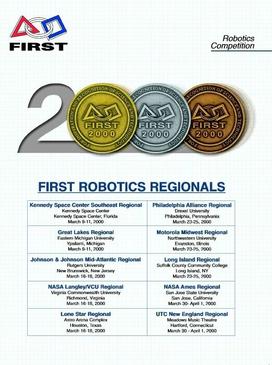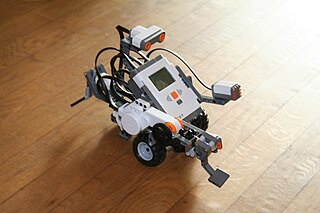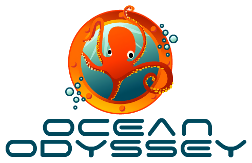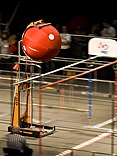
Lego Mindstorms is a discontinued line of educational kits for building programmable robots based on Lego bricks. It was introduced on 1 September 1998 and discontinued on 31 December 2022.

The FIRST LEGO League Challenge is an international competition organized by FIRST for elementary and middle school students.

Liberty High School (LHS) is a four-year public high school in Eldersburg in Carroll County, Maryland.

Co-Opertition FIRST was the 2000 game for the FIRST Robotics Competition.

Lego Mindstorms NXT is a programmable robotics kit released by Lego on August 2, 2006. It replaced the Robotics Invention System, the first-generation Lego Mindstorms kit. The base kit ships in two versions: the retail version and the education base set. It comes with the NXT-G programming software or the optional LabVIEW for Lego Mindstorms. A variety of unofficial languages exist, such as NXC, NBC, leJOS NXJ, and RobotC. A second-generation set, Lego Mindstorms NXT 2.0, was released on August 1, 2009, with a color sensor and other upgrades. The third-generation EV3 was released in September 2013.

Robofest is an autonomous robotics competition for 4th - 12th graders. It is similar to FIRST Lego League (FLL), but while FLL limits the student's robots to Lego Mindstorms robots, Robofest allows the student to use any robotics system, parts, materials, or even custom electronics, in some of the events. Note that FLL students are required to use parts manufactured by Lego only, preventing the use of such aids as string or glue. Another important difference is that Robofest games have UTF components. Students must solve the unveiled tasks and factors within 30 minutes work-time without external help. Lawrence Tech's Robofest was founded by Computer Science Professor Dr. Chan-Jin Chung in 1999–2000 academic year and is sponsored by Lawrence Technological University and other sponsors. LTU's Robofest is also held internationally, in countries including Brazil, Canada, China, Colombia, Ecuador, Egypt, Ethiopia, England, France, Ghana, Greece, Hong Kong, Hungary, India, Kenya, Lebanon, Macau, Malawi, Mexico, Morocco, Nigeria, Philippines, Saudi Arabia, Singapore, South Africa, South Korea, Taiwan, Jordan, and UAE. Teams who win their regional event are welcome to participate at the worldwide tournament held at Lawrence Technological University in Michigan. ROBOFEST is a registered trademark of Lawrence Technological University. Robofest is one of the largest University led robotics competitions in the world for pre college students.

Nano Quest was the name of the 2006–07 challenge theme of FIRST Lego League. It revolved around the emerging field of nanotechnology.

FIRST LEGO League Explore (FLLE) is a non-competitive robotics program designed for children ages six to ten. It is one of the programs established by FIRST.

The FIRST Championship is a four-day robotics championship held annually in April at which FIRST student robotics teams compete. For several years, the event was held at the Georgia Dome in Atlanta, Georgia, but moved to the Edward Jones Dome in St. Louis, Missouri in 2011, where it remained through 2017. In 2017, the Championship was split into two events, being additionally held at the George R. Brown Convention Center and Minute Maid Park in Houston, Texas. In 2018 and 2019, the Championship was held in Houston and Detroit, Michigan at the TCF Center and Ford Field. The event comprises four competitions; the FIRST Robotics Competition Championship, the FIRST Tech Challenge World Championship, the FIRST Lego League World Festival, and the FIRST Lego League Junior World Expo.
Livingston Robotics Club (LRC) is a robotics club in Livingston, New Jersey, that provides a community network to introduce Livingston area youth to robotics design and real-life science research, consistent with the vision of FIRST. LRC is known for its member teams as winners at state, national, and international FIRST LEGO League (FLL) competitions.
FIRST LEGO Challenge League Open Championships are robotics competitions held and managed by FIRST LEGO League Partners to bring FIRST LEGO League Challenge teams from many states, regions and countries together to compete in host cities around the world. These are the highest level of FIRST LEGO League competitions that are managed by organizations other than FIRST. The FIRST-managed global competition for FIRST LEGO League is the FLL World Festival. There are usually multiple Open Championships each year.

Smart Move is the name of the 2009-10 FIRST Lego League challenge, released September 3, 2009. It is centered on transport and how to make new and more efficient forms.

For Inspiration and Recognition of Science and Technology (FIRST) is an international youth organization that operates the FIRST Robotics Competition, FIRST LEGO League Challenge, FIRST LEGO League Explore, FIRST LEGO League Discover, and FIRST Tech Challenge competitions. Founded by Dean Kamen and Woodie Flowers in 1989, its expressed goal is to develop ways to inspire students in engineering and technology fields. Its philosophy is expressed by the organization as Coopertition and Gracious Professionalism. FIRST also operates FIRST Place, a research facility at FIRST Headquarters in Manchester, New Hampshire, where it holds educational programs and day camps for students and teachers.
Mission Mars was the 2003-04 challenge theme of FIRST Lego League. It revolved around the NASA missions to Mars with the Spirit and Opportunity rovers.

Body Forward is the 2010-11 FIRST Lego League competition. The project and missions revolve around biomedical engineering.
Climate Connections was the 2008-09 FIRST Lego League competition. Its theme centered on understanding the effects of climate and climate change.

Ocean Odyssey is the 2005-06 FIRST Lego League challenge theme. It centered on topics relating to the world's oceans and oceanography. The challenge was developed with the collaboration of the Woods Hole Oceanographic Institution and the Monterey Bay Aquarium Research Institute.

No Limits is the 2004-05 FIRST Lego League challenge theme. It focused on solutions for aiding people with physical disabilities. The year's theme was introduced by the story Late for Lunch by James Patrick Kelly, which the described the life of a disabled child.

Bowled Over!, released on 10 September 2011, is the 2011–12 robotics competition for FIRST Tech Challenge. Two alliances compete to score racquetballs into alliance-colored scoring goals. The name refers to two bowling balls on the field used for scoring points.

Hydro Dynamics is the name of the 2017/18 FIRST Lego League challenge. It focuses on the water cycle and the ways in which humans can influence it. Each event consists of two main portions: the project and robot gameplay. Teams have fewer than ten weeks to prepare for their competitions.


















